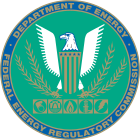Federal Energy Regulatory Commission
 |
|
| Agency overview | |
|---|---|
| Formed | October 1, 1977 |
| Preceding | |
| Jurisdiction | U.S. government |
| Headquarters | Washington, D.C., U.S. |
| Agency executive |
|
| Parent agency |
|
| Website | www |
The Federal Energy Regulatory Commission (FERC) is the United States federal agency that regulates the transmission and wholesale sale of electricity and natural gas in interstate commerce, and regulates the transportation of oil by pipeline in interstate commerce. FERC also reviews proposals to build interstate natural gas pipelines, natural gas storage projects, and liquefied natural gas (LNG) terminals, and FERC licenses non-federal hydropower projects.
The top priorities of FERC include:
The Federal Power Commission (FPC), which preceded FERC, was established by Congress in 1920 to allow cabinet members to coordinate federal hydropower development.
In 1935, the FPC was transformed into an independent regulatory agency with five members nominated by the President and confirmed by the Senate. The FPC was authorized to regulate both hydropower and interstate electricity.
In 1938, the Natural Gas Act gave FPC jurisdiction over interstate natural gas pipelines and wholesale sales. In 1942, this jurisdiction was expanded to cover the licensing of more natural gas facilities. In 1954, the Supreme Court decision in Phillips Petroleum Co. v. Wisconsin extended FPC jurisdiction over all wellhead sales of natural gas in interstate commerce.
In response to the 1973 oil crisis, Congress passed the Department of Energy Organization Act in 1977, to consolidate various energy-related agencies into a Department of Energy. Congress insisted that a separate independent regulatory body be retained, and the FPC was renamed the Federal Energy Regulatory Commission (FERC), preserving its independent status within the Department. FERC was also given added responsibility to hear appeals of DOE oil price control determinations and to conduct all "on the record" hearings for DOE. As a result, DOE does not have any administrative law judges. As a further protection, when the Department of Energy proposes a rule, it must refer the proposal to FERC, and FERC can take over the proceeding if FERC determines that the rulemaking "may significantly affect" matters in its jurisdiction. The DOE Act also transferred the regulation of interstate oil pipelines from the Interstate Commerce Commission to FERC. However, the FERC lost some jurisdiction over the imports and exports of gas and electricity.
...
Wikipedia
